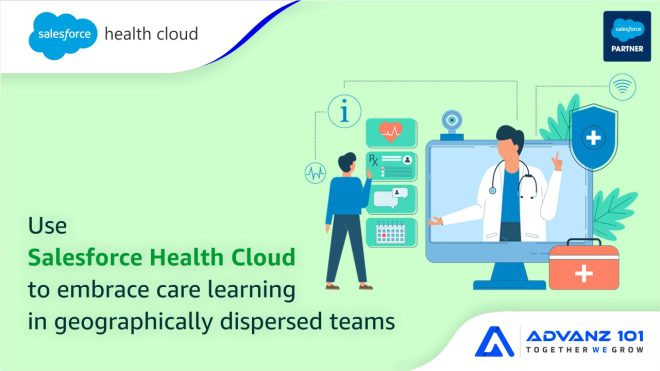In our last article, we discussed that by leveraging the platform’s powerful features and customization options, Salesforce Health Cloud could be used to create a comprehensive solution for improving and providing holistic health outcomes. This blog will discuss the next phase of the value-based healthcare implementation framework, i.e., how Salesforce Health Cloud can integrate care learning among team members available on-site or remotely.
Integration and collaboration among care team members can help hospitals and healthcare systems to leverage the existing infrastructure and resources of community providers to improve access to services, reduce costs, and improve the overall quality of care. The healthcare system should be organized on the common medical ailments that individuals experience, as was covered in this article. Expanding geographically rather than working locally is necessary to embrace the learning of IPUs (integrated practice units), essentially groups of healthcare professionals from all disciplines collaborating to provide comprehensive care to patients with a specific medical condition.
When care services are integrated, it reduces the need for coordination because they are all working together as a team. This can be achieved in a variety of ways:
- Create shared goals.
- Identify shared resources.
- A common platform to communicate.
- Provide resources in a unified manner.
This kind of integration results in improved communication, more efficient processes, and better health outcomes. Additionally, integrated teams can take advantage of the insights and expertise of each team member to create more comprehensive solutions that tackle the problem from multiple angles. Also, this form of collaboration can increase effectiveness and reduce redundancies by enabling frequent formal and informal communication. Having a larger team structure across various locations allows teams to develop and implement best practices more quickly and consistently, leading to better patient outcomes. In addition, the team structure can be used to develop training and education programs for clinicians, enabling them to stay updated with the latest advances in their field.
With Salesforce Knowledge, one can create and manage learning in the form of articles. An article can contain the protocols use to manage conditions or can hold educational materials that can be sent to patients. It can also track, monitor, and report on the usage of this content, so it could be understood how it is helping towards shared goals. Salesforce Knowledge also includes features such as the ability to personalize the user experience, manage custom fields, set up workflows and automation. Thus, provide resources in a unified manner. This makes it easier to keep knowledge content up-to-date and relevant to healthcare professionals, patients, members, and the care team.
Health Cloud Assessments and Surveys help to improve care management by gathering feedback from patients and members. The surveys provide insights into how care is being delivered, patient outcomes, and potential gaps in care. It also provides healthcare organizations with valuable data that can be used to informed decisions and improved patient outcomes. The healthcare organizations can identify areas for improvement and create strategies to better meet patient needs with the help of assessments and surveys. This further can be used to embrace care learning among team members.
The Chatter feed can be used as a common platform to collaborate among geographically dispersed care teams. Additionally, it allows members to respond to each other’s questions and concerns quickly and easily, or to post comments or questions for the entire team to see. This helps to ensure that everyone is on the same page, and that any issues or concerns are addressed in a timely manner.
With many years of experience in healthcare and associated technologies, Advanz101 Business Systems is a trusted partner of Salesforce CRM solutions and consulting services.
Learn more about how Advanz101 Systems can help you overcome the challenges associated with adopting Salesforce Health Cloud.
References
- https://www.ncbi.nlm.nih.gov/pmc/articles/PMC7185050/
- https://www.isc.hbs.edu/health-care/value-based-health-care/Pages/default.aspx
- https://help.salesforce.com/s/articleView?id=sf.experience_cloud_for_health_cloud_faq.htm&type=5
- https://developer.salesforce.com/docs/atlas.en-us.health_cloud_object_reference.meta/health_cloud_object_reference/object_ref_overview.htm


